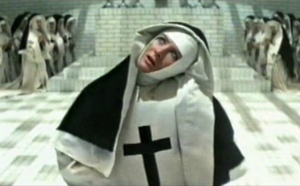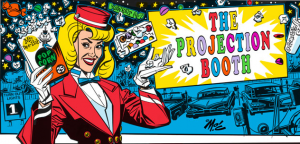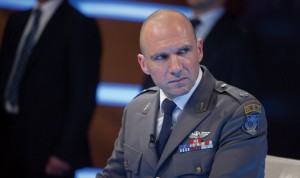Joining us is special guest co-host filmmaker Vincenzo Natali.
Our special guest this week is film critic/author Richard Crouse discussing his book “Raising Hell: Ken Russell and the Unmaking of the Devils.”
 “… Speaking by phone from Toronto, film critic Richard Crouse, who wrote the 2012 book “Raising Hell: Ken Russell and the Unmaking of the Devils,” said, “It’s a film that is about sex, about religion, about violence, and that corner in which all three of those things intersect. Good does not necessarily triumph over evil, and in that way I think Ken Russell, who was a devout Catholic, presented a story that helped him question his faith, deepen his faith, but also have a long hard look at his faith. And he did it on film, for everyone to see…”
“… Speaking by phone from Toronto, film critic Richard Crouse, who wrote the 2012 book “Raising Hell: Ken Russell and the Unmaking of the Devils,” said, “It’s a film that is about sex, about religion, about violence, and that corner in which all three of those things intersect. Good does not necessarily triumph over evil, and in that way I think Ken Russell, who was a devout Catholic, presented a story that helped him question his faith, deepen his faith, but also have a long hard look at his faith. And he did it on film, for everyone to see…”
Read the whole Boston Globe article by Ed Symkus HERE!
From the Facebook page Free Ken Russell’s The Devils: To answer another question many people have asked; yes, there WILL be a petition to sign. As this campaign is in its early days, I’m still working out the details, but keep your eyes peeled. In the meantime; SHARE, TWEET, BLOG, COMMENT and WRITE. Go to Twitter and tweet #FreeTheDevils
Read Guillermo Del Toro’s fiery plea for this hard-to-see masterpiece’s release on Blu Ray and DVD HERE.
Read about Richard’s book “Raising Hell: Ken Russell and the Unmaking of The Devils” HERE! Buy it HERE!
 From The Projection Booth’s website:
From The Projection Booth’s website:
Joining us is special guest co-host filmmaker Vincenzo Natali.
Our special guest this week is film critic/author Richard Crouse discussing his book “Raising Hell: Ken Russell and the Unmaking of the Devils.”
 Instead of running the title card “based on a true story” up front, “The Whistleblower,” a new drama starring Rachel Weisz, Monica Bellucci and Vanessa Redgrave, begins with the disclaimer “inspired by true events. Some of the characters may be composites or fictitious.” No “just the facts ma’am” for this movie. The filmmakers decided to take a perfectly serviceable and important story and tart it up with Hollywood story elements. Because facts are often stranger than fiction, it’s a shame they didn’t stick more with the truth and less with the movie contrivances.
Instead of running the title card “based on a true story” up front, “The Whistleblower,” a new drama starring Rachel Weisz, Monica Bellucci and Vanessa Redgrave, begins with the disclaimer “inspired by true events. Some of the characters may be composites or fictitious.” No “just the facts ma’am” for this movie. The filmmakers decided to take a perfectly serviceable and important story and tart it up with Hollywood story elements. Because facts are often stranger than fiction, it’s a shame they didn’t stick more with the truth and less with the movie contrivances.
Weisz plays Kathryn Bolkovac a Nebraska policewoman based on a real life person of the same name. Divorced, she’s desperate to move across country to be closer to her kids but can’t lay her hands on either the job transfer or the money to make the trip. To raise the cash she takes a six month job as a peace keeper in Sarajevo, Bosnia. War has ended and a company called Democra Security has been contracted by the U.N. to help smooth the transition from strife to peace. Soon, however, she uncovers a human trafficking ring specializing in young women sold into prostitution. Uncovering a far reaching conspiracy she finds herself making some powerful enemies.
“The Whistleblower” is a well intentioned film that more often than not plays like an episode of “Law & Order: SVU,” albeit with more exotic locations. It’s a police procedural with many of the tried and true plot devices of the genre. Evidence seems to show up when needed, progress is inevitably slowed by bureaucratic process and the main character is true blue. “I’m an American police officer,” she says to a young woman afraid that the U.N. isn’t going to be able to help, “it doesn’t matter who I work for.” No that’s plucky.
Where it differs from other procedurals is in its uncompromising imagery. A dank dungeon brothel is identified by close-ups of chains, dirty mattresses and used condoms and a scene involving the bad guys disciplining one of their captives is too grim to be described here. Those scenes have impact and underline the importance of telling this story from a humanist standpoint, but from a cinematic perspective it all feels kind of standard and often borders on the sanctimonious.
Weisz, in the role that Mariska Hargitay would have played if this was a TV movie, brings some depth to the gritty cop stereotype we’ve seen a hundred times before, conveying urgency and determination.
“The Whistleblower” is topped by an effective and exciting final reel but for my money it takes just a bit too long to get there.
 Anyone who tries to argue that Shakespeare is no longer relevant only has to see “Coriolanus,” the new film by Ralph Fiennes, based on the Bard’s 1608 play, to be proven wrong. The story of a banished Roman hero who vows revenge on his city has echoes of the Occupy Wall Street movement, the Tea Party and the 99%. That it also has a towering performance by Vanessa Redgrave is simply the icing on the top of a very old cake.
Anyone who tries to argue that Shakespeare is no longer relevant only has to see “Coriolanus,” the new film by Ralph Fiennes, based on the Bard’s 1608 play, to be proven wrong. The story of a banished Roman hero who vows revenge on his city has echoes of the Occupy Wall Street movement, the Tea Party and the 99%. That it also has a towering performance by Vanessa Redgrave is simply the icing on the top of a very old cake.
Set in present day Rome, the film centers on the title character (Fiennes), a great warrior who despises the people he is sworn to protect. When his run for elected office is undone by his extreme opinions, scheming politicians and an end run by his mother, Volumnia (Vanessa Redgrave) he is banished from Rome. Seeking revenge he hatches a plan with his sworn enemy Tullus Aufidius (Gerard Butler) to destroy Rome. A dramatic appeal from Volumnia changes his mind, but alienates his new ally.
Ralph Fiennes, in his directorial debut, takes a little known play and makes it relevant for our times. In light of the world’s recent social unrest—London riots, Occupy this and that, Syria—Fiennes has reached deep into the past to place modern events in context. The four hundred old dialogue reveals the primal nature of man—and how it hasn’t changed.
The fight for power, the thirst for revenge, the bond between a mother and son, the disenfranchisement of the people; these topics are as fresh today as they were in Shakespeare’s day.
Timeliness aside, the film works as a dramatic piece. Fiennes uses handheld cameras to add a sense immediacy, as though we’re watching a live newscast. As usual the wobbly cam makes one feel seasick by the time the first double-cross has happened, but it does add visual energy. Add to that battle scenes shot by The Hurt Locker cinematographer Barry Ackroyd and you have a movie filled with lines like “Death, that dark spirit, in ‘s nervy arm doth lie; Which, being advanced, declines, and then men die,” and yet feels absolutely modern.
As for the acting, Fiennes is fine, refined yet feral. Voldemort with a nose and a habit a furiously spitting as he speaks. Gerrad Butler surprises with his range and Brian Cox as the backstabbing politico Menenius, a two-faced senator playing both sides against the middle is powerful, but it is Vanessa Redgrave who controls the screen.
Distilling decades of performing Shakespeare on film and the stage she hits all the right notes, creating a character who would be recognizable to a seventeenth century audience, but works beautifully on screen. Her final showdown with her son on a barren road is a tour-de-force and worth the price of admission alone.
“Coriolanus” isn’t the masterful work that Ian McKellan’s “Richard III” was, but it is a passionate, interesting film that feels ripped from the headlines.
 SYNOPSIS: With a plot that mixes and matches themes from history and Shakespeare’s plays, “Anonymous” uses the backdrop of the struggle for succession between the Tudors and the Cecils as the Essex rebellion moves against Queen Elizabeth I (Vanessa Redgrave) to set the scene for the debut of Shakespeare’s plays. But were they actually written by Shakespeare? The movie supposes it was Edward De Vere, Earl of Oxford (Rhys Ifans)—the Anonymous of the title—who penned plays attributed to William Shakespeare.
SYNOPSIS: With a plot that mixes and matches themes from history and Shakespeare’s plays, “Anonymous” uses the backdrop of the struggle for succession between the Tudors and the Cecils as the Essex rebellion moves against Queen Elizabeth I (Vanessa Redgrave) to set the scene for the debut of Shakespeare’s plays. But were they actually written by Shakespeare? The movie supposes it was Edward De Vere, Earl of Oxford (Rhys Ifans)—the Anonymous of the title—who penned plays attributed to William Shakespeare.
Star ratings:
Richard: 4 Stars
Mark: 3 Stars
Richard: Mark, this is a sprawling story with many twists and turns. The downside is the film’s sketchy casting. In flashbacks the queen and Edward appear to be the same age, but later after a major twist, are revealed to be sixteen years apart. This kind of lack of attention to detail makes it difficult to follow the story in the first hour. Soon enough, however, all the players are straightened away and the pleasures of the story take hold.
Mark: Sorry, but is the authorship of Shakespeare’s plays a burning issue for anyone? Whenever they try to make Shakespeare “sexy” I want to hurl. And yet, there were a lot of things to like about the movie. Pageantry geeks will swoon for the production design, theatre buffs will groove to the re-creations of the Elizabethan stage, and middle age women will get hot flashes at all the bodice ripping. But why was the story so hard to follow?
RC: It’s hard to follow because it assumes we know the political history and can juggle an abundance of powdered wigs with royal titles, many of whom kind of look alike. Having said that though, I think Ifans is terrific here. A little of him usually goes a long way but he’s doing some interesting work here.
MB: Is it racist to say that all British fops in the same facial hair look alike? I hope not… You’re right about Ifans- he’s the soul of a very messy movie and anchors it with his sad eyes. Lots of good acting, (David Thewlis, Joely Richardson, and Sebastian Armesto as Ben Johnson) and lots of good overacting, too, from the rest of the cast. One of the things that will jolt most viewers is the way Shakespeare himself is portrayed- as a murderous, scheming, illiterate; so antithetical to our reverence for the man that I found it quite unnerving.
RC: I don’t think Anonymous has much to do with historical fact–there is no real life evidence that the Earl of Oxford penned the plays–it’s just a palette for a twisted tale about how politics and art intersect, and the written word’s ability to instigate change.
MB: I know that’s what the movie aims for, but it doesn’t quite pull it off. There are two stories here: one is a literary biopic, the other a political thriller, and they don’t exactly mesh. But I think it’s a movie that would become clearer after a second viewing